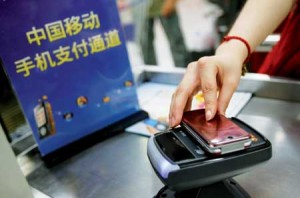Mobile commerce could eventually replace conventional forms of commerce
Mobile payments may actually do away with cash in the relatively near future. The Institute of Electrical and Electronics Engineers (IEEE) has released a new report that highlights security issues in the mobile commerce space. The report does show that security issues are quite serious, but the mobile commerce space may overcome these issues to outpace traditional forms of commerce and become favored among consumers. IEEE surveyed 2,000 technology enthusiasts for the report.
Consumers remain concerned about security risks that exist in the mobile space
According to the report, 70% of those that the company surveyed believe that mobile payments will be secure enough to replace cash by 2030. Many consumers are already interested in new payment services, but they rarely use these services due to concerns regarding their security. Consumers believe that their personal information could be at risk of exploitation if they use their mobile devices to make purchases. These are not unfounded worries, as mobile payments services have been targeted by malicious groups in the past.
Consumers are worried about unauthorized purchases and malicious QR codes
 Of those surveyed, 46% said they were worried that their payment information would be stolen. Another 33% claimed that they were worried that unauthorized payments would be made through mobile services. Approximately 13% were worried that they would accidentally make a payment through an NFC sticker or QR code. Consumers are also concerned that their mobile devices may be infected by scanning a malicious QR code. These concerns have come together to discourage consumers from participating in mobile commerce.
Of those surveyed, 46% said they were worried that their payment information would be stolen. Another 33% claimed that they were worried that unauthorized payments would be made through mobile services. Approximately 13% were worried that they would accidentally make a payment through an NFC sticker or QR code. Consumers are also concerned that their mobile devices may be infected by scanning a malicious QR code. These concerns have come together to discourage consumers from participating in mobile commerce.
Companies are beginning to aggressively address security issues in order to make mobile commerce safer
While consumers are worried about their financial information, companies in the mobile commerce space are beginning to address these concerns. Several have begun using biometric technology to protect their mobile payments services. Tokenization is also becoming popular in the mobile commerce space. This involves replacing consumer information with digital tokens, which can be used to authenticate mobile transactions.
GfK report highlights worries over the security of new payment services
Security is still a major concern for consumers that are interested in mobile payments. While mobile transactions account for only a small portion of commerce overall, they are becoming more popular among consumers throughout the world. While this popularity is growing, consumers are still concerned how new payment platforms will protect their financial information. According to a new report from GfK, a prominent market research firm, these security concerns could slow the adoption of mobile commerce among consumers.
Few consumers are comfortable with the security offered by mobile commerce platforms
According to the report from GfK, mobile payments only account for 3% of all transactions being made in the United States. The majority of consumers prefer to use their debit cards to pay for goods and services. Not only are consumers more comfortable with conventional payment solutions, they also believe that mobile payments services are not secure enough. Approximately 52% of consumers believe that new payment services are not able to keep their personal information secure. Only 16% believe that mobile commerce services are more secure that more conventional forms of payment.
More companies are working to improve the security of mobile payments services
 Security concerns are nothing new for the mobile commerce industry. Over the past several years, consumers have expressed their worry that new payment services were simply not able to protect their information. The companies responsible for these services have been working to make them more secure, with many now making use of biometric technology. This technology leverages biological information to protect payment services. Consumers can protect their information with something as simple as a fingerprint, which has done much to secure confidence in mobile commerce among consumers.
Security concerns are nothing new for the mobile commerce industry. Over the past several years, consumers have expressed their worry that new payment services were simply not able to protect their information. The companies responsible for these services have been working to make them more secure, with many now making use of biometric technology. This technology leverages biological information to protect payment services. Consumers can protect their information with something as simple as a fingerprint, which has done much to secure confidence in mobile commerce among consumers.
Younger consumers are less concerned about security and privacy issues
Notably, younger consumers, those between the ages of 18 and 24, are less concerned about security and privacy issues. Approximately 33% of these consumers say they are completely confident in the security of mobile payments services. They believe that new payment services are not only secure, but also very convenient and allow them to shop and purchase products no matter where they may be without having to rely on traditional forms of commerce.
 Of those surveyed, 46% said they were worried that their payment information would be stolen. Another 33% claimed that they were worried that unauthorized payments would be made through mobile services. Approximately 13% were worried that they would accidentally make a payment through an NFC sticker or QR code. Consumers are also concerned that their mobile devices may be infected by scanning a malicious QR code. These concerns have come together to discourage consumers from participating in mobile commerce.
Of those surveyed, 46% said they were worried that their payment information would be stolen. Another 33% claimed that they were worried that unauthorized payments would be made through mobile services. Approximately 13% were worried that they would accidentally make a payment through an NFC sticker or QR code. Consumers are also concerned that their mobile devices may be infected by scanning a malicious QR code. These concerns have come together to discourage consumers from participating in mobile commerce.
 Security concerns are nothing new for the mobile commerce industry. Over the past several years, consumers have expressed their worry that new payment services were simply not able to protect their information. The companies responsible for these services have been working to make them more secure, with many now making use of biometric technology. This technology leverages biological information to protect payment services. Consumers can protect their information with something as simple as a fingerprint, which has done much to secure confidence in mobile commerce among consumers.
Security concerns are nothing new for the mobile commerce industry. Over the past several years, consumers have expressed their worry that new payment services were simply not able to protect their information. The companies responsible for these services have been working to make them more secure, with many now making use of biometric technology. This technology leverages biological information to protect payment services. Consumers can protect their information with something as simple as a fingerprint, which has done much to secure confidence in mobile commerce among consumers.